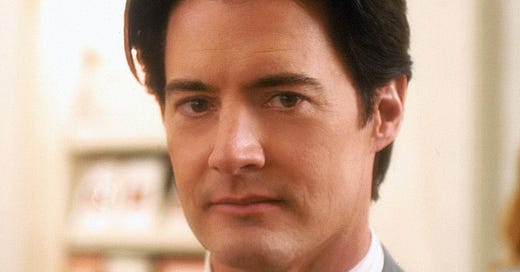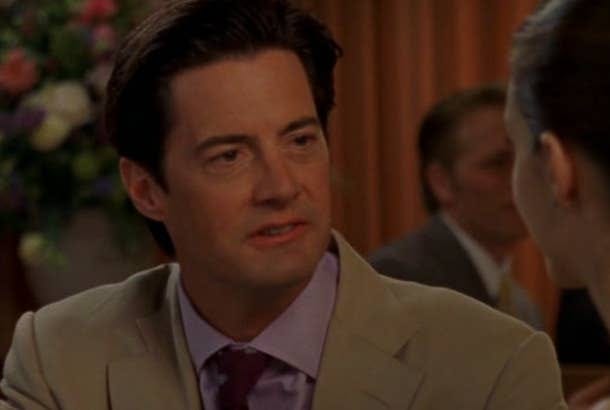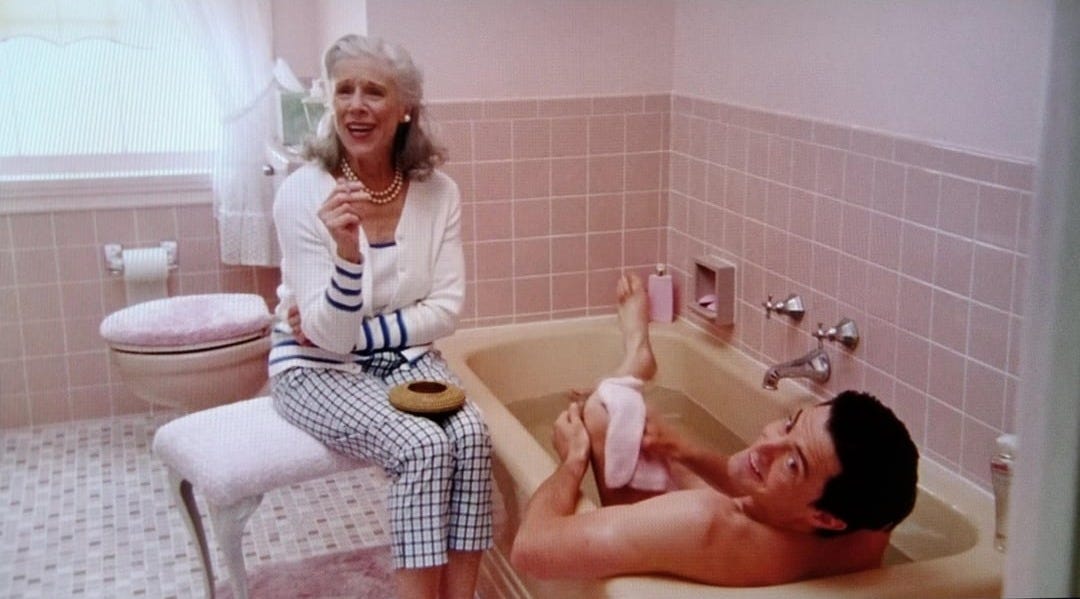Recently, after dinner, my friends and I gathered to watch a few episodes of Sex & The City. We’ve been working our way through the show like this intermittently, some of us for the first time, some of us for the 5th (definitely, totally NOT me…). This particular viewing caught me just as I was starting to hit the numbing out phase of my most recent anxiety spiral, which kind of looks like this:
Unfortunately, or fortunately, depending on how you swing it, there is nothing like a SATC haze to numb you. I went home, and I binged. To be clear, I am no Sex & The City champion. There’s a laundry list of reasons it’s problematic. I’m not here to say it’s anything more than what it is: a very good show to numb out to.
Note: To the friends I went home and continued watching without, I will pick it back up right where we left off, together! I’ve watched Sex and the City a million times before, and I’ll watch it a million times again. I will be your SATC sisyphus
On my latest bender, I noticed an element of the plot that didn’t add up. Granted, a lot of things in Sex & The City do not add up (How does Carrie manage to pay rent and fund her wardrobe on a writer’s salary?), but the point of show, the point of numbing out really, is to let go, suspend disbelief, allow yourself to be taken along for the ride. I know that; it’s why I binge! Yet, here I am stewing because this particular hangup happens to be the same issue that made me spiral into this rewatch.
It’s Trey.
In case it’s been a while since your last SATC run-through, allow me to refresh you on Trey. Trey is, for a short time, Charlotte’s husband. They have a tumultuous relationship haunted by Trey’s inability to approach emotional and, subsequently, physical intimacy, his overbearing, ever-present mother, and the shadow cast by their infertility. Just as they’ve made the decision to separate, they have the chance to be featured in House & Garden. As Charlotte stands dejected, embarrassed to be alone in their home, Trey swoops in for the photoshoot as a gesture to Charlotte.
A season later, when Trey’s mother, Bunny, goes to battle with Charlotte during the divorce, Trey swoops in from afar with a telegram insisting that his mother give Charlotte everything she wants, apartment included. With these final good deeds, Trey gets to walk away as A Good Guy in the end.
The thing is, I know Trey would not have given Charlotte the apartment.
When Trey and Charlotte first have issues in the bedroom, Trey is so embarrassed and uncomfortable that he refuses to discuss it despite Charlotte’s attempts at bridging the distance by any means necessary, She has them go to therapy (normal!), cuts out her wedding photos and glues her face onto the figures in his porn magazine (sad, but hilarious!), and eventually stands before him and strips out of a sultry nightgown as she begs him to see her as both wife and sexual being (heartbreaking!).
Eventually, Charlotte reaches a breaking point and moves back to her old apartment. Only then is Trey able to be her lover. They go through a spell of in-betweenness as lovers who are not quite divorced and not quite together until Charlotte is driven to another breaking point by the uncertainty underlying their relationship.
Only when Trey is presented with a scenario where inaction will cause him greater discomfort (divorce, estrangement, dealing with the emotional fallout) does he do something. He shows up at Charlotte’s door and asks her to move back in with him. This is a pattern. When Charlotte tells Trey he has to speak to his mother to set boundaries for him and Charlotte as a unit, he conveniently develops a sore throat and is unable to speak. When Charlotte mentions adoption, Trey can’t even talk to her about it and instead tells Bunny in hopes that she’ll handle the situation (Which… the framing of interest in adoption as a “situation” to be “handled…” Gross!).
Do you really think this guy would go to bat against his mother for Charlotte?
Trey is deeply avoidant and would not do anything that made him uncomfortable. It’s not hard to see why. He comes from an old-money family, the kind that insists that all players on the tennis court wear white and keeps a household staff. Trey was certainly never destitute. He also had Bunny, a helicopter mom who was all too keen to make his decisions for him. While an overbearing parent can be difficult, it might have been the one thing that could have actually provided enough friction for Trey to realize his own values, stand up, and say, actually, this is what I want and what I believe.
Instead, he’s perfectly happy to let Bunny run his life.
Bunny says a hard mattress is the way to go? A hard mattress it is. It’s the same with the wine he drinks and the restaurants he frequents. Bunny handles his pre-nup; Bunny handles his divorce. Trey has had everything taken care of for him for his entire life.
When someone spends their entire life never needing to confront or deal with anything, they don’t suddenly choose, unbidden, to do something that will have great emotional cost (in the case of Trey, that would be conflict with his dear mother) and no benefit to themselves, for a person and relationship that they have already demonstrated an inability to give real care or effort to.
So yeah, Trey never would have gone out of his way to ensure that Charlotte got the apartment. Trey is not A Good Guy, or at least not my idea of A Good Guy. In my book, A Good Guy has principles. Principles require some level of self-sacrifice. To be principled means that your beliefs and your values matter more than your convenience or your comfort. If your principles naturally lend themselves to the way you live your life without ever calling for some level of grappling, change, or self-sacrifice, you don’t have principles; you have moral relativism.
Trey never had principles. He had the refined manners and agreeable demeanor of the upper class, which are supposed to fool us into thinking that “nice” translates to good. I’m not saying that manners don’t matter, but tact is not character.
If my point in all of this was Trey = bad, this might be a nonsensical rant (albeit a cathartic one) I’m certainly not the first person to think Trey sucks! Also, of course Trey’s character is inconsistent and unrealistic! This is Sex & The City! If I wanted realism and consistency, I’d look elsewhere. I’m fine with the unrealistic portrayal of a character’s character in my fiction, but what bothers me is the way that it seems like superficiality as a stand-in for integrity has bled over into reality.
A few days ago, I texted my friends, “I can’t believe XYZ (Fill in the blank with any number of options. You may very well have been sending similar texts to your friends)!” My friend, who spends his days teaching middle and high schoolers, responded:
“We aren’t taught how to respond to those who break societal norms. How do you respond to a student who flat-out refuses to follow school rules? What do you do when a student curses you out or throws a desk? There aren’t procedures for what to do when the rules about rules are broken.”
A broken social norm is deeply uncomfortable, but when a student throws a desk, the teacher can’t just smile, turn the other way, and pretend nothing is happening. They have to deal with it because their job requires them to adhere to a set of behaviors that makes it possible for everyone to learn. That’s their job because that is what the school values.
Outside of the clear power dynamic between an adult and children, and the more rigid social structure of a classroom, our responsibility to address discomfort can feel a lot more ambiguous. It is so much easier to give an awkward smile, look the other way, and hope that someone else will take care of it. It’s enough to “hold” the right beliefs, even if there’s never any action connected to said beliefs. Amiability is enough. Mannerisms and demeanor serve as signifiers of Good People whom we can trust.
When faced with discomfort, the people who consistently show us that they’re not going to address anything will wring their hands and posture. Yet, people who do this get the same treatment as Trey. They give and do nothing, yet they’re Good Guys.
If people want to conflate nicety with principle, that’s their business, but can we please stop acting like it makes them decent?
The people who consistently show that they’re not going to do hard or uncomfortable things are not going to save us. Acting in accordance with our own principles might not save us either, but at least we’ll know that we are not Trey.









